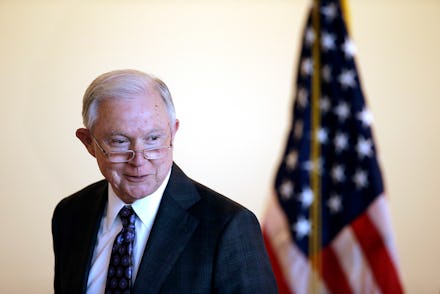Georgetown students, faculty protest Jeff Sessions’ speaking engagement at university

Ahead of United States Attorney General Jeff Sessions’ widely publicized speaking engagement at Georgetown University, the school’s students and faculty banded together in joint protest against the appearance by the Trump administration’s chief lawyer on Tuesday morning.
That protest, which occurred on the main steps of Georgetown’s campus, assembled over 100 people in an effort to rebuke the beleaguered Attorney General.
Some Georgetown community members “took a knee” in nod to NFL players’ protests through the weekend following President Donald Trump’s admonition of athletes exercising their free speech rights.
“Today we stand together united in the name of free speech at Georgetown,” one of the speakers at the protest said. “[Sessions] has proven himself over and over again to be against free speech, to be against justice, and today we take a knee.”
At his appearance, Sessions is expected to address the issue of free speech on college campuses. According to CNN, he will condemn America’s universities for “transforming into an echo chamber of political correctness and homogenous thought, a shelter for fragile egos.”
But though the attorney general will take aim at the sanitization of discussion and debate at colleges across the country, many students on Georgetown’s campus complain that they have been disinvited from Sessions’ speaking engagement in order to ensure a “sympathetic audience” for the attorney general.
“Today, more than 130 Georgetown Law students were curtly disinvited after being told by the school that they had tickets,” Daniel Blauser, Georgetown Law American Constitution Society President, said in a statement on Tuesday. “We welcomed the debate but, sadly, the school seems to want to limit attendance to help ensure a sympathetic audience.”
Lauren Phillips, a second-year law student, challenged Sessions on the apparent hypocrisy.
“We invite Jeff Sessions to practice what he preaches and face our questions on his department’s policies,” Phillips said. “We hope in the future that AG Sessions will be brave enough to engage in the robust debate that he claims to value.”
A copy of the university’s email disinviting students from the Sessions event was provided to Mic by one of the students organizing the protest. In it, the school justified its decision to rescind invitations from students not associated with the Georgetown Center for the Constitution — an organization in the university’s law school that espouses the originalist interpretation of law championed by the late Antonin Scalia — by arguing that the initial invite should never have been sent to them in the first place.
“Regrettably, the email you subsequently received indicating you have a seat for the event was in error,” the email from the university said. “Our records indicate that you were not part of the center’s student invitation list, which includes student fellows of the center (students who signed up to attend events sponsored by the center) and students enrolled in the classes taught this semester by the center’s director, professor Randy Barnett.”
Because the school did not “bcc” the recipients of the email, Mic can confirm that it was sent to over 130 people.
Blauser explained to Mic that, while Sessions’ policies were a “huge contributing factor” in students’ decision to protest, he emphasized that students were generally not outraged that the attorney general would be speaking at the university — that is, until they learned they would not have the opportunity to debate him on his “horrendous policies and history.”
Law professors at the university criticized the attorney general for extolling the virtues of free speech while Trump has admonished NFL players for practicing their First Amendment rights in protest of the police killings of unarmed black Americans.
According to BuzzFeed, the letter from faculty called Trump’s remarks on athletes an example “of governmental action antithetical to freedom of speech and association for which Attorney General Sessions is either closely affiliated or directly responsible.”
They added, “This kind of government chilling of speech is precisely what the First Amendment to the United States Constitution is meant to prevent. A man who fails to recognize paradigmatic violations of the First Amendment is a poor choice to speak about free speech on campuses.”